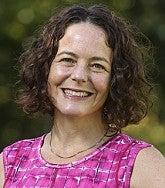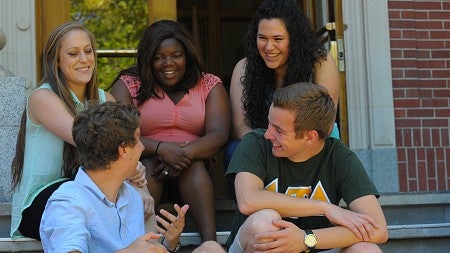Message from the Vice Provost and Dean, Lisa Freinkel

In this year’s Common Reading selection, award-winning author Ta-Nehisi Coates describes what it is to question and transform. He describes his education at “the Mecca,” Howard University, as an awakening that plummeted him into the “unceasing contradictions” of the archive, of the classroom and the textbook, of human experience and human life. The unceasing contradictions that compose the many textures of a Self.
“…I began to see discord, argument, chaos, perhaps even fear, as a kind of power. I was learning to live in the disquiet I felt in Moorland-Spingarn [Research Center], in the mess of my mind. The gnawing discomfort, the chaos, the intellectual vertigo was not an alarm. It was a beacon.” (p. 52)
Imagine: discomfort as a beacon and not an alarm. Disorientation as the engine of transformation–alongside self-compassion, generosity, breadth of heart and wisdom. How do we engineer the right kind of discomfort and chaos for ourselves and for our students? How do we engineer the right kind of transformation? Wouldn’t that be an amazing question to answer right now, for our own community as well as for our nation?
Freedom of thought, and the academic freedom which may be its best proxy, form the bedrock of our democracy and nourish the innovation that keeps our world flourishing and vibrant. Most fundamentally, this principle of freedom underlies our educational system. Some observers, however, argue that this bedrock principle is endangered by interventions like trigger warnings and “safe spaces.” For some observers, such interventions only enable retreat—not freedom.

But freedom is big. Our community of learners incorporates so many different perspectives, so many disparate life experiences. Traumas and triumphs sit side by side in one classroom and often in one student. For all of us discomfort is indeed, by its very nature, an alarm: a sign that our protective boundaries have been breached to a greater or lesser extent. Turning that alarm into the kind of beacon Coates describes is, precisely, our job as educators, advisors, support staff. To do so means we must engineer a community where inclusion is our best synonym for freedom.
Over the long haul, and particularly in our programming this year, Undergraduate Studies will be working with the Division of Equity and Inclusion and many other partners to build a more inclusive learning community for our campus. Our efforts will include support for inclusive and intercultural teaching development, for undergraduate research and engagement, for student success—and of course for our common reading text: Between the World and Me. We hope you’ll be in touch.
